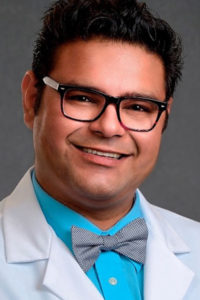
Delivery of effective education is a challenge not just in medicine, but in other industries as well. Lessons learned from these other industries might provide valuable insights for medical education, said Viren Kaul, MD, chair of Monday’s session What Can Be Learned from Other Industries to Enhance a Medical Educator’s Repertoire at 4:30 pm in room 262 of the convention center. This session will expose attendees to strategies used by other high-intensity and responsibility occupations and how to translate this application to medical education.
Dr. Kaul shares more about the session:
What is the impetus for your session?
→ Educating future generations of physicians is an important aspect of medicine. There has been an increasing focus on evolution of medical education to include strategies effective for educating adult learners. I wanted to bring in experienced educators from other fields to discuss strategies, especially in various challenging situations.
Please explain why effective teaching methods are critical for learners.
→ Adult learners learn effectively when they feel ready to learn, are motivated, feel they are learning something they can implement reliably, and when they are directing the learning as opposed to it being instructor-led. Teaching strategies that are designed around these components of learning lead to better engagement, retention, and less learner stress.
What are some of the teaching strategies you will share with the audience?
→ We will address strategies to address different subset of learners in various situations including high-risk situations, dealing with difficult learners, providing feedback without placing undue blame, and how to include learners’ backgrounds to improve educational performance. The session speakers will discuss how to implement the tenets of adult learning theory into every day medical education scenarios including reverse classroom models, sequential learning exercises, and technological inclusion in education.
How do some of them incorporate technology and transformative learning?
→ Technology, including social media, app-based learning and media-rich digital environments are easily available in today’s world. I teach my own trainees over a WhatsApp group we have created, and the interest in that kind of asynchronous and self-directed learning is very high amongst learners. There are some “simple” rounding techniques that are integral for transformative learning, but in my opinion, creation of a safe learning space is the very first step.
What other industries are you gathering tips from to apply to medical education?
→ Two of our experts are leaders in the fire departments: Dr. Prezant is well known internationally for his work with the New York City firemen and understanding the impact 9/11 had on the first responders’ pulmonary systems. Syracuse City Fire District Chief Zachary Smith has extensive experience with training new recruits to Syracuse Fire Department. Mr. Rahul Bhan comes from the fast-paced realm of investment banking while Mr. Jeremy Stewart is a lawyer with experience in the teaching and private practice world.
What is the goal of the session and what are some practical takeaways you want attendees to leave with?
→ Our goal is to bring up challenging situations that educators in medicine experience and get tangible advice from our speakers on strategies and tools that work for them. It is an interactive session, so relevant questions from the audience members will be entertained, and as such, this is a great opportunity to gain pearls from these educators from nonmedical fields. We would like our attendees to leave with a few new arrows in their educator’s quiver to apply to their own situations to make the learning experience better for their trainees.





